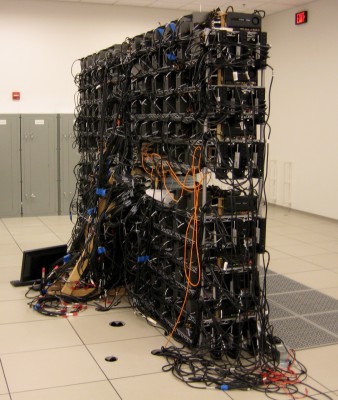
I ran my own server for a while. It was an OpenBSD box running on a cheap 386 board in a re-purposed PC case with an extra ethernet card. It sat between my cable modem and my home network and acted as a firewall. It also provided a few services to me in the outside world. In particular, it ran a little program for tunneling ssh traffic through the http hole in the corporate firewall, so I could get into my home network from work. (It was not, let me be clear, the supercomputer shown in the image to the right.)
I turned it off several years ago. Desktop computers got more secure, so the firewall was no longer necessary. I quit working at a regular job, so I didn’t need to tunnel my ssh traffic any more. But the main thing was that external firms started providing the sort of services that had previously made it seem worth going to the trouble of running your own server.
I use a bunch of those services. I share photos at Flickr. I host this website at Dreamhost. I post things on Facebook, Google+, and Twitter. I read RSS feeds using The Old Reader (and share things there as well).
I’d previously thought that it would be best to have my own server for all these things—in particular sharing stuff I wanted to share—my writing, my pictures, my calendar items, etc. But the commercial services were better than what I’d have had if I ran my own server. Flickr provides a much better gallery than I’d have managed to put up, if I’d had to host my own. (The idea of serving—and owning—your own data was the impulse behind Diaspora as well, of course.)
Just lately, though—especially since Google announced that they were shutting down Google Reader—I’ve begun to rethink things.
If I ran my own server, I wouldn’t have to worry that some giant company would abruptly decide that providing some service I was using “no longer aligned with corporate priorities.”
I’m not in any hurry to move from this new thinking to actually running my own server again. For one thing, it wouldn’t make any sense to try to run a public-facing server at home over a consumer-grade home network link. (Although maybe one of the higher-grade packages through UC2B would be good enough.) But I am thinking about it. I don’t like any of the calendar services out there; maybe running my own calendar service, just for me and my family, would be just the thing.
In any case, running a server would be a lot easier now than it was back when I did it before. The hardware is cheaper and faster. The software is more reliable and easier to use. Before, I had to painstakingly build everything. Now I could just do a quick install on a Raspberry Pi, maybe with Freedom Box software.
I’ve always known that with “free” corporate services I’m not a client; I’m a commodity being pimped out to advertisers and others. I’ve tolerated it, because the “free” services are often pretty good—better than I could manage if I had to roll my own. But it’s always bugged me. Now, between the hardware and software for rolling my own getting cheaper and better, and the increased visibility of the consequences of going with free services that get can get turned off on corporate whim, maybe I’ll get it together to make the jump to my own server once again.
